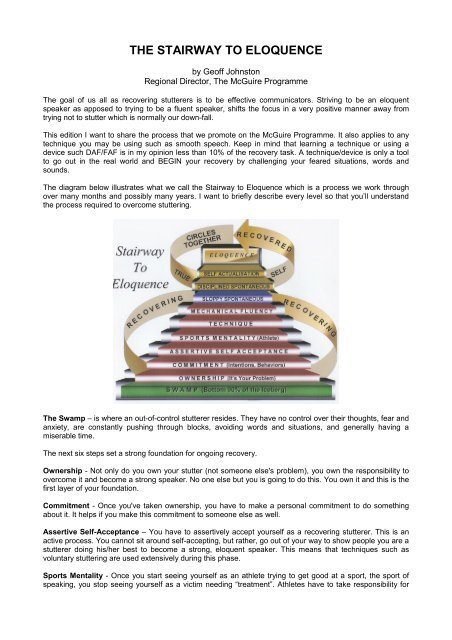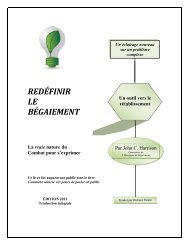THE STAIRWAY TO ELOQUENCE - The McGuire Programme
THE STAIRWAY TO ELOQUENCE - The McGuire Programme
THE STAIRWAY TO ELOQUENCE - The McGuire Programme
You also want an ePaper? Increase the reach of your titles
YUMPU automatically turns print PDFs into web optimized ePapers that Google loves.
<strong>THE</strong> <strong>STAIRWAY</strong> <strong>TO</strong> <strong>ELOQUENCE</strong><br />
by Geoff Johnston<br />
Regional Director, <strong>The</strong> <strong>McGuire</strong> <strong>Programme</strong><br />
<strong>The</strong> goal of us all as recovering stutterers is to be effective communicators. Striving to be an eloquent<br />
speaker as apposed to trying to be a fluent speaker, shifts the focus in a very positive manner away from<br />
trying not to stutter which is normally our down-fall.<br />
This edition I want to share the process that we promote on the <strong>McGuire</strong> <strong>Programme</strong>. It also applies to any<br />
technique you may be using such as smooth speech. Keep in mind that learning a technique or using a<br />
device such DAF/FAF is in my opinion less than 10% of the recovery task. A technique/device is only a tool<br />
to go out in the real world and BEGIN your recovery by challenging your feared situations, words and<br />
sounds.<br />
<strong>The</strong> diagram below illustrates what we call the Stairway to Eloquence which is a process we work through<br />
over many months and possibly many years. I want to briefly describe every level so that you’ll understand<br />
the process required to overcome stuttering.<br />
<strong>The</strong> Swamp – is where an out-of-control stutterer resides. <strong>The</strong>y have no control over their thoughts, fear and<br />
anxiety, are constantly pushing through blocks, avoiding words and situations, and generally having a<br />
miserable time.<br />
<strong>The</strong> next six steps set a strong foundation for ongoing recovery.<br />
Ownership - Not only do you own your stutter (not someone else's problem), you own the responsibility to<br />
overcome it and become a strong speaker. No one else but you is going to do this. You own it and this is the<br />
first layer of your foundation.<br />
Commitment - Once you've taken ownership, you have to make a personal commitment to do something<br />
about it. It helps if you make this commitment to someone else as well.<br />
Assertive Self-Acceptance – You have to assertively accept yourself as a recovering stutterer. This is an<br />
active process. You cannot sit around self-accepting, but rather, go out of your way to show people you are a<br />
stutterer doing his/her best to become a strong, eloquent speaker. This means that techniques such as<br />
voluntary stuttering are used extensively during this phase.<br />
Sports Mentality - Once you start seeing yourself as an athlete trying to get good at a sport, the sport of<br />
speaking, you stop seeing yourself as a victim needing “treatment”. Athletes have to take responsibility for
their own progress. So do you. Everything that it takes to become good at a sport (or musical instrument) is<br />
needed to become good at the sport of speaking.<br />
Technique - As in any skilled sport, proper technique needs to be learned and drilled before one can play a<br />
good game.<br />
Mechanical Fluency - Until the technique is automatic and all feared words and situations are over-killed,<br />
you should be sounding fairly mechanical and not too many words per breath. This is a higher level of selfacceptance.<br />
You are being “mechanical” because you are a stutterer and this is what you have to do to<br />
become a strong, eloquent speaker.<br />
Generally, if you're having more than your share of turbulence or chronically relapsing, one or more<br />
of your foundations layers are not solid.<br />
Sloppy Spontaneous - You might reach the “orbit zone” before you've grooved your technique. You will feel<br />
so free and fluent that it will be very difficult for you to be disciplined and stay in the mechanical stage. It's<br />
much like trying to keep a baby from being born. You will use virtually no technique and will probably be<br />
quite normally dysfluent. Congratulations! This means you have over-killed all your feared words and<br />
situations and are truly, albeit temporarily, free from stuttering and on your way to eloquence. You will no<br />
doubt however, take a fall from here back down to the swamp. <strong>The</strong>n you will have to rebuild your foundation,<br />
stay longer in the mechanical stage and hopefully go to the stage called:<br />
Disciplined Spontaneous - This is where you don't really have to think about any technique for speaking,<br />
but the technique itself is habituated and is happening automatically. You have struck a nice balance<br />
between discipline and spontaneity. You are, by this point, quite articulate.<br />
Road to Self-Actualisation - For most, self-actualisation is a lifetime process. It is the process of overlapping<br />
your “two circles” so that what others see is what they get and you are realising your potential to do<br />
with this precious life exactly what you want to be doing and know exactly who you are in relation to the<br />
world and other people. <strong>The</strong> important thing is to be on the road to self-actualisation. This makes things you<br />
say very interesting to other people, and this leads to:<br />
Eloquence - You enjoy and feel what you are saying. Other people enjoy and feel what you are saying. And<br />
you do this with good voice tone and good articulation.<br />
Where are you on your own individual journey to become a more effective and eloquent speaker? What do<br />
you have to do to take your recovery to the next level on <strong>The</strong> Stairway to Eloquence?<br />
I think the most common fault with graduates of all programmes regardless of the technique being taught is<br />
that they don’t take the time to build a strong enough foundation. <strong>The</strong>y reach a level of “fluency”, think they<br />
have it licked and sit back on their heels. A relapse is certain in these cases. Stick at it and build a foundation<br />
that can withstand the most severe challenges.



